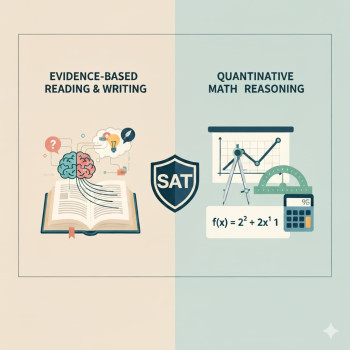AP vs SAT in 2025: The Big Question
If you re a student (or a parent of one) navigating the maze of college admissions in 2025, you ve probably asked or been asked this exact question: should I focus on AP classes and exams, or on the Digital SAT? Which one will make a stronger impression on college admissions officers?
This article walks you through the nitty-gritty not just the slogans. We ll explore how admissions teams view Advanced Placement (AP) coursework and exam scores, how the Digital SAT fits into the picture, how each can help you earn credit or placement once you matriculate, and how to make strategic decisions based on your passions, school context, and future goals. Along the way I ll share practical examples, side-by-side comparisons, and realistic study approaches including how personalized tutoring (like Sparkl s 1-on-1 guidance and tailored study plans) can fit into a balanced, effective plan.

Why the Question Matters in 2025
College admissions have become more holistic over the past decade. Test-optional policies, rising emphasis on coursework rigor, and the widespread use of AP exams for credit and placement have changed some of the old rules. Yet the foundational truth remains: colleges want evidence that you challenged yourself, learned deeply, and are likely to succeed academically on their campus.
How you choose to provide that evidence through AP classes and exams, through a high Digital SAT score, or both depends on your academic strengths, the colleges you re targeting, and the timing of your application. In short: there s no one-size-fits-all answer. But there are clear patterns and smart strategies you can use.
AP Exams: What They Show and Why They Matter
AP Coursework as a Signal
Taking AP courses signals ambition and intellectual curiosity. Admissions officers often look at the context: did you take the most rigorous courses available at your school? A transcript filled with AP (or IB/Honors) courses can speak louder than a single test score because it shows sustained effort across a semester or year.
AP Exam Scores and College Credit
AP exams can also deliver direct, practical benefits once you re admitted. Many colleges grant course credit or placement for qualifying AP scores often starting at a score of 3, with broader credit at 4 or 5. This can let you skip introductory courses, pursue a double major, or even graduate early, saving time and tuition.
Beyond credit, strong AP scores sometimes support admissions decisions for specific programs (like honors colleges or selective majors) because they offer evidence of mastery in relevant subjects.
Digital SAT: What It Shows and Why It Matters
Standardized Snapshot of Readiness
The Digital SAT is a standardized measure used to compare applicants who come from different schools and backgrounds. Whereas AP coursework shows how much you stretched yourself in school, the Digital SAT provides a controlled comparison of problem-solving, reading comprehension, and math reasoning across a large applicant pool.
Why Colleges Still Care Especially for Scholarship and Placement
Even at many test-optional schools, a high Digital SAT score can strengthen merit scholarship applications, qualify you for certain campus programs, and be an objective complement to a subjective application. For students from small or lesser-known high schools, a strong Digital SAT can create confidence for an admissions reader who otherwise might struggle to compare coursework rigor across schools.
AP vs SAT: Head-to-Head Practical Comparison
Below is a compact comparison to help you weigh the options tailored to admissions and post-admission benefits.
| Feature | AP Exams | Digital SAT |
|---|---|---|
| What it demonstrates | Mastery of college-level subject content over a course | General readiness via standardized reading, writing, and math skills |
| Admissions impact | Shows rigor on transcript; may strengthen major-specific applications | Provides objective benchmark; useful for merit awards and out-of-school comparisons |
| Post-admit benefits | Credit and placement (skip intro courses, graduate early) | Some placement benefits; mainly scholarship and honors program implications |
| Best for | Students who excel in specific subjects and can complete AP coursework | Students seeking to demonstrate broad academic readiness or maximize scholarship chances |
| Preparation style | Semester-long study, coursework, labs, projects | Timed practice, strategy, and content review (shorter, focused bursts) |
How Admissions Officers Really Use AP and SAT in 2025
Admissions readers evaluate applications holistically, blending transcript review, test scores (if submitted), essays, recommendations, extracurricular impact, and contextual factors such as school opportunities and personal circumstances. Two realistic, common patterns stand out:
- If your transcript shows consistent rigor (lots of APs) and strong grades, colleges tend to trust that record more than a single test score. It s evidence you sustained effort and succeeded in challenging courses.
- If you apply without test scores (test-optional), excellent AP coursework and exam results can fill that evaluative gap. Conversely, if your school doesn t offer many APs, a strong Digital SAT helps admissions compare you to others on a common scale.
In sum, AP and SAT answer slightly different questions for an admissions committee: APs answer Did you challenge yourself and learn deeply? while the Digital SAT answers How do you perform on a common, controlled measure?
Which Should You Prioritize? Questions to Ask Yourself
Here are practical questions that make the choice personal, not hypothetical.
- How many AP classes does your school offer and in what subjects? If your school s AP offerings are limited, stacking a transcript full of APs may not be possible or necessary.
- Are you applying to majors that value subject mastery (e.g., STEM majors value Calculus, Chemistry, Physics APs)? Strong APs in those subjects can be persuasive.
- Are you seeking merit aid? High Digital SAT scores often carry more weight for scholarship committees.
- What s your learning style? Do you excel in semester-long projects and labs (APs), or are you stronger at short, focused test sessions where strategy matters (SAT)?
- Timing and bandwidth: Can you realistically balance AP coursework and SAT prep during the same year without burning out?
Crafting a Practical 12 18 Month Plan
Below is a sample timeline you can adapt. The idea is to blend steady AP coursework with targeted Digital SAT prep so both feed your application rather than compete with it.
- Junior Year Fall: Focus on AP coursework you re already enrolled in. Start baseline Digital SAT practice (one diagnostic test) to identify weak areas.
- Junior Year Winter: Continue AP work; add weekly, focused SAT practice (1 2 targeted sessions). Consider an SAT practice test every 6 8 weeks. Seek feedback from teachers on AP projects.
- Junior Year Spring: Concentrate on AP exams (classroom learning should carry you most of the way). Reduce heavy SAT study during AP exam weeks to avoid overload.
- Summer after Junior Year: Intensive Digital SAT prep block (practice tests, targeted math or evidence-based reading drills). Strengthen college list and draft essays.
- Senior Year Fall: If you plan to submit SAT scores, take the Digital SAT early (or retake if needed). Balance senior-year APs with essay finalization and application tasks.
Real-World Examples Two Student Profiles
Case A: Maya The STEM Seeker
Maya took AP Calculus BC, AP Physics C, AP Chemistry, and AP Computer Science. Her transcript is rigorous with strong grades, and she scored 4s and 5s on her APs. Her Digital SAT is good but not stellar. For selective engineering programs, Maya s AP subject mastery and lab experience are a strong signal that she can handle major-specific coursework. She also used AP credits to place out of introductory calculus in her first semester, freeing up room for research and internships.
Case B: Jamal The Contextual Underdog
Jamal attends a smaller high school with fewer AP offerings. He took the most rigorous classes available and did very well, but his transcript lacks national comparison points. He focused on the Digital SAT and achieved a top-quartile score. That objective result gave admissions officers a clear benchmark to compare Jamal s readiness with applicants from larger schools, and it strengthened his scholarship case.
How To Combine APs and Digital SAT to Maximize Admissions Impact
Combining both is often the most powerful approach if you have the bandwidth. Here s a short playbook:
- Use AP coursework for depth: pick 2 4 APs aligned with your intended major or academic strengths and aim to excel in those.
- Use the Digital SAT for breadth: a strong score helps in comparison and scholarship situations, especially if your school s course offerings are limited.
- Be strategic about score sends: send AP scores that showcase subject strength and SAT scores when they add value to your specific application.
Where Personalized Tutoring Fits (Yes, Sparkl Can Help)
Personalized coaching can be a game-changer, especially when time and energy are tight. One-on-one tutoring helps you use study time efficiently, target your weakest spots, and reduce test anxiety. Sparkl s model with tailored study plans, expert tutors, and AI-driven insights is a good example of how tutoring can be integrated without taking over your schedule. Tutors can help:
- Set a realistic schedule that preserves your mental health during AP exam weeks.
- Identify AP areas where improved study habits convert directly to higher scores.
- Run tight, strategic Digital SAT practice sessions that emphasize timing, question selection, and high-yield content.
Used judiciously, tutoring supports both AP mastery and SAT performance and can be especially helpful when you re trying to boost a weak section while maintaining strong coursework.
How Colleges Use AP Credit After You re Admitted
Receiving AP credit can change your college experience in meaningful ways:
- Place into higher-level courses early, which can lead to deeper major exploration or research opportunities.
- Free up electives for minors, internships, or a lighter course load as you acclimate to college life.
- Potentially graduate earlier, saving on tuition and enabling a quicker start to graduate school or a career.
Keep in mind: AP credit policies vary by institution and department. Some colleges accept AP credit for general education but not for major requirements. Always check the school s AP policy for specifics and deadlines for sending scores.
Common Myths Debunked
- Myth: A perfect SAT score is more important than APs. Reality: Not necessarily. A perfect SAT helps, especially for scholarships, but sustained AP rigor and high grades often carry equal or more weight in holistic admissions review.
- Myth: APs guarantee admission. Reality: APs are one factor among many. Grades, essays, recommendations, extracurriculars, and fit matter a lot.
- Myth: If my school doesn t offer APs, I m at a big disadvantage. Reality: Colleges evaluate students in the context of what was available. A challenging course load relative to your school s offerings plus strong standardized scores can be persuasive.
Practical Tips for Students and Parents
- Talk to your guidance counselor early about which APs make sense for your goals and how your school s offerings compare to others.
- Use one quality Digital SAT diagnostic to shape your study plan don t try to guess where to focus.
- Balance ambition with sustainability. Two APs done exceptionally well are often better than five APs with mediocre grades.
- Consider targeted tutoring if you need to boost a specific AP score or SAT section personalized plans are more efficient than generic courses.
- Keep an organized score-sending calendar AP score sends have specific deadlines and many schools want scores before matriculation.

Final Takeaway: What Impresses Admissions More in 2025?
Here s the simplest way to think about it: admissions officers want a coherent, credible story of academic readiness. AP coursework and strong AP exam scores emphasize depth and sustained academic challenge. The Digital SAT provides an objective, comparable measure across different schools. Neither is strictly better they play complementary roles. If you can do both well, you give admissions officers the clearest and most convincing portrait of your readiness.
So in 2025, what impresses admissions more depends on your context: if your transcript already demonstrates clear, sustained rigor and mastery in subject areas that align with your intended major, APs may be the stronger signal. If you attend a school with limited advanced offerings or you need an objective comparison for scholarship or out-of-school recognition, a strong Digital SAT can make a big difference.
Closing Advice Build Your Own Winning Mix
Start by auditing your strengths and constraints: your school s AP offerings, your target colleges preferences, your test-taking strengths, and your other commitments. Create a plan that values depth (APs) and breadth (Digital SAT) in a way that fits your life. Lean on targeted help whether that s a trusted teacher, a counselor, or personalized tutoring like Sparkl s 1-on-1 guidance to sharpen your path without burning out.
Admissions in 2025 favors well-told stories backed by evidence. Your transcript, test scores, essays, and recommendations are all pieces of that story. Make each part count, and trust that a thoughtful, balanced approach will do more for your college prospects than chasing any single shiny metric.
Quick Checklist Before You Send Scores
- Confirm each college s AP credit policy and deadlines.
- Decide whether the Digital SAT score adds value to each application you submit.
- Plan AP score sends carefully free score sends have deadlines; paid sends are available later but cost money.
- Reserve time for a final SAT practice test and a calm checklist before the test day.
- Consider one-on-one tutoring if you have a narrow window to improve a key AP or SAT measure.
Good luck and remember: whether APs or the Digital SAT impress more depends mostly on how well you choose, prepare, and present them. Do that thoughtfully, and you ll give admissions officers exactly the kind of evidence they want: proof that you re ready for the next chapter.















No Comments
Leave a comment Cancel